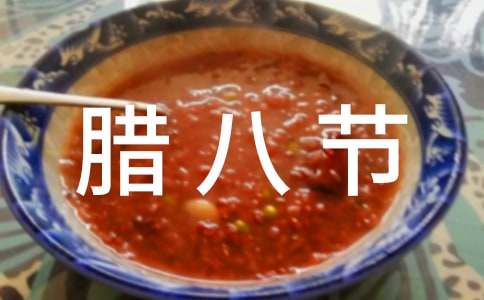- 相关推荐
考研英语拓展阅读:腊八节及腊八粥的来历
过了腊八就是年,在今天吃上一碗热乎乎的腊八粥,感觉离家更近了。年味也更浓了。关于腊八节的由来有不同的传说,腊八粥又是怎么传承过来的呢,小编就来带大家一起来品味品味这个腊八节和腊八粥,也希望考研的孩子们在新的一年里有更好的际遇。

【腊八节的由来】
Laba Festival there are two legendary origin. Buddha Sakyamuni Buddha said that a move mountain cultivation. December eighth day that day because of hunger and fatigue Zaidao street, was a shepherdess found with large gruel saved so that he Dachedawu. Enlightenment and Buddha. One said that the Ming emperor Zhu Yuan-hour cattle to the rich because the rich bracket was broken off in a room, three days did not give anything to eat, he was unbearable hunger. Searched everywhere. Finally found a rat hole, dig out the beans, grain and other food, Zhu Chengyu consumption, find it very sweet.
腊八节的由来有两个传说。一说佛祖释迦牟尼成佛前进山修行.十二月初八这天因饥饿劳累栽倒路旁, 被一牧羊女发现,用大米粥救活,使他大彻大悟.得道成佛。一说,明朝皇帝朱元璋小时给财主放牛,因牛腿摔断被财主关在一间屋子里,3天没给饭吃, 他饥饿难忍.到处搜寻.终于发现了一个老鼠洞,从中挖掘出豆、谷等各种粮食,煮成粥食用,觉得非常香甜。
Later, the emperor made the emperor, thinking a child eat porridge and that the taste of Dayton, he ordered his eunuchs to use a variety of food cooked up a pot of sugar porridge, feast courtiers, after North Korea Wenwubaiguan emulated and passed civil society, Sui Cheng A holiday customs. By Zhu Yuan sugar porridge eighth day of the days of the twelfth lunar month, so this porridge is also called laba porridge.
后来朱元璋做了皇帝,想起小时候吃那顿粥 的味道,就命太监用各种粮食煮了一锅糖粥,欢宴群臣,后朝中文武百官争相效仿并传入民间,遂成了一种节日习俗。因朱元璋吃糖粥的日子是腊月初八, 所以这粥也就叫腊八粥了。
Laba is a grand festival of Buddhism. Before the liberation around the temple for Buddha’s Birthday will be held prayers, and, like the Buddha into the Road, before the story of The Legend of chylous Munv Xian, with fragrant valley, fruit, etc. porridge worship Buddha, called laba porridge. Laba porridge and will be presented to the disciples and the believers, it would be in civil Xiangyan into the vulgar. Some monasteries in the twelfth lunar month is said to eighth day before the hand-held by the monks alms bowl, street alms, will be collected rice, chestnuts, dates, nuts and other ingredients laba porridge distributed to the poor.
“腊八”是佛教的盛大节日。解放以前各地佛寺作浴佛会,举行诵经,并效仿释迦牟尼成道前, 牧女献乳糜的传说故事,用香谷、果实等煮粥供佛,称“腊八粥”。并将腊八粥赠送给门徒及善男信女们,以后便在民间相沿成俗。据说有的寺院于腊 月初八以前由僧人手持钵盂,沿街化缘,将收集来的米、栗、枣、果仁等材料煮成腊八粥散发给穷人。
After eating legend could be the Buddha’s blessing, so poor, it is called the Buddha congee. Southern Song Dynasty, Lu You a poem that goes: at the present Buddha congee is more relative to feed, and anti-sense Emura a new section of material. Hangzhou temples temple is said to store leftovers within a stack of rice floor, usually every day the monks leftovers dried, plot a years of surplus grain to the lunar calendar laba porridge boiled eighth day he gave copies to his followers, known as Fu-zhou Ford porridge, which means that after eating you can Zengfu Zengshou. It is obvious that the monks cherish the virtues of food.
传说吃了以后可以得到佛祖的保佑,所以穷人把它叫做“佛粥”。南宋陆游诗云:“今朝佛粥更相馈,反觉江村节物新。”据说杭州名刹天宁寺内有储藏剩饭的“栈饭楼”平时寺僧每日把剩饭晒干, 积一年的余粮,到腊月初八煮成腊八粥分赠信徒,称为“福寿粥”“福德粥”意思是说吃了以后可以增福增寿。可见当时各寺僧爱惜粮食之美德。
【腊八粥的来历】
据说在释迦牟尼成佛之前,曾经修苦行多年,饿得骨瘦如柴,决定不再苦行。这时遇见一个牧女,送他乳糜食用。他吃了乳糜,恢复了体力,便端坐在菩提树下入定,于十二月八日成道。夏历以十二月为腊月,所以十二月八日称作腊八。中国汉族地区,将这一天作为释迦牟尼的成道日,于是腊八成了佛教节日。佛教传入我国后,各地兴建寺院,煮粥敬佛的活动也随之盛行起来,尤其是到了腊月初八,祭祀释迦牟尼修行成道之日,各寺院都要举行诵经,并效法佛成道前牧女献乳糜的传说故事,用香谷和果实等造粥供佛,名为腊八粥。这便是腊八粥的来历。
Laba rice porridge was first introduced to China in the Song Dynasty about 900 years ago.
腊八粥在大约900年前的宋代首次引入中国。
Buddhism was well accepted in the areas inhabited by the Han Chinese, who believed that Sakyamuni, the first Buddha and founder of the religion, attained enlightenment on the eighth day of the twelfth month. Sutras were chanted in the temples and rice porridge with beans, nuts and dried fruit was prepared for the Buddha. With the passing of time the custom extended, especially in rural areas where peasants would pray for a plentiful harvest in this way.
在汉族人居住的地区,佛教被广泛地接受,人们相信第一个佛和佛教的创始人释迦牟尼在第十二个月的第八天得到了启发。佛经在寺庙了被吟诵,含豆、坚果和干果的粥用来供奉佛主。随着时间的推移,这个风俗扩展开了,尤其是在乡村地区,农民们以这种方式祈祷好的收成。
There is, however, another touching story: When Sakyamuni was on his way into the high mountains in his quest for understanding and enlightenment, he grew tired and hungry. Exhausted from days of walking, he fainted away by a river in India. A shepherdess found him there and fed him her lunch -- porridge made with beans and rice. Sakyamuni was thus able to continue his journey.
然而,还有一个动人的故事:当释迦牟尼在通向他寻求领悟和启发的高山的路上,他又累又饿。由于几天的行走而产生的疲惫,他在印度的一条河边晕倒。一个牧羊女发现了她并喂他午饭,饭是由豆和米做成的粥。于是,释迦牟尼能够继续他的旅程。
After six years of strict discipline, he finally realized his dream of full enlightenment on the eighth day of the twelfth lunar month. Ever since, monks have prepared rice porridge on the eve and held a ceremony the following day, during which they chant sutras and offer porridge to Buddha. Thus, the tradition of eating Laba porridge was based in religion, though with the passing of time the food itself became a popular winter dish especially in cold northern China.
经过六年严格的修行,他最终于十二月的第八天实现了他完全启发的梦想。从那时到现在,僧侣们在前日准备米粥,在第二天举行仪式,在此期间,他们吟诵佛经,并为佛祖供奉米粥。因而,吃腊八粥的传统是以宗教基于宗教的,可是,随着时间的推移,这种食物本身尤其是在寒冷的北方成为受欢迎的冬季食物。
According to written records, large Buddhist temples would offer Laba rice porridge to the poor to show their faith to Buddha. In the Ming Dynasty about 500 years ago, it became such a holy food that emperors would offer it to their officials during festivals. As it gained favor in the feudal upper class, it also quickly became popular throughout the country.
【考研英语拓展阅读:腊八节及腊八粥的来历】相关文章:
腊八粥的故事及来历01-18
闽清腊八粥的做法01-18
腊八豆腐的来历故事01-18
腊八粥的由来英文版01-18
重阳节的来历英语(精选12篇)10-23
考研英语阅读理解模拟题(历史学)04-13
考研英语阅读四大题型命题思路解析07-26
英语考研真题01-07
重阳节来历10-15
端午节来历06-06